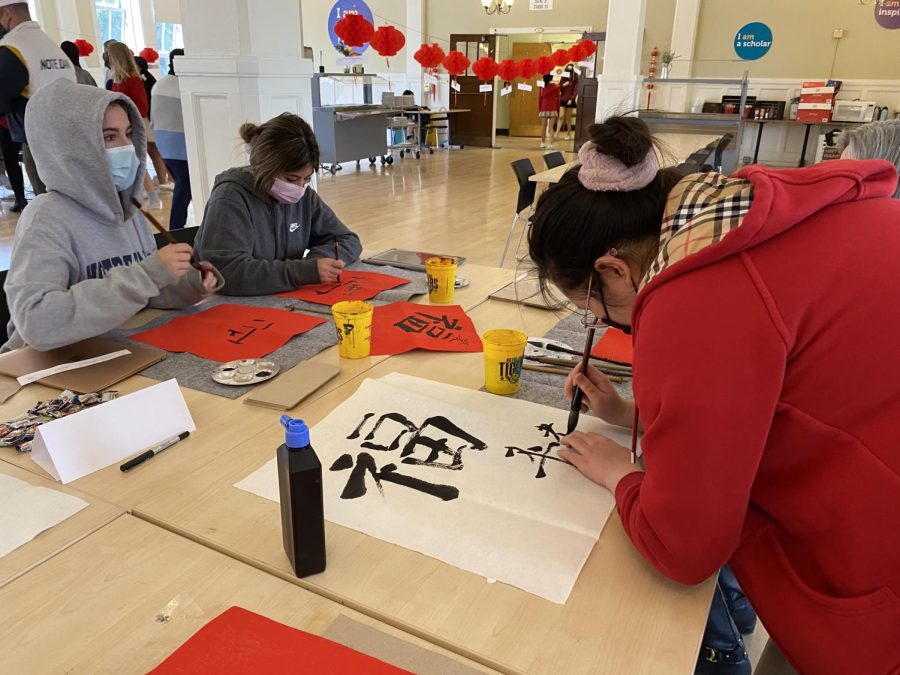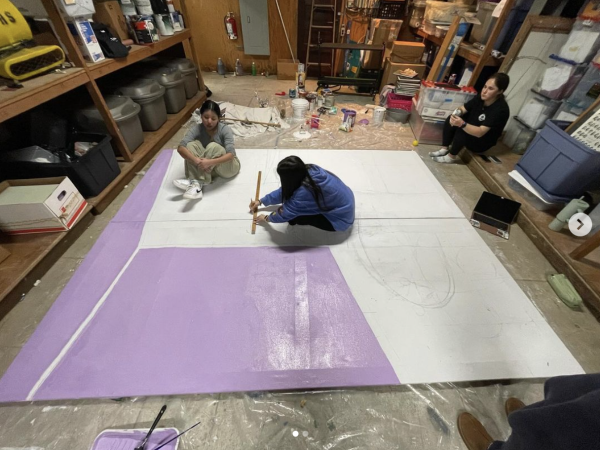NDB community celebrates Lunar New Year
The Catalyst / Ariel Lucas
Junior and ISP Foundations team member, Helen Ren, participates in the Lunar New year festivities held during collaboration on January 31.
Just as many western countries mark the start of the year on January 1 with fireworks, parties and resolutions, several Asian cultures celebrate Lunar New Year. This holiday takes place on the first day of the first month according to the Lunar calendar, and celebrations end on the fifteenth day of the new year.
The history of this event traces back to folklore stories, the most popular of which is a Chinese myth called the Story of Nian. This legend tells of a mythical beast named Nian, who would attack villagers each new year. The beast was scared of the color red, so traditional celebrations and decorations centered around the color to keep the beast away.
The holiday falls on February 1 this year, and during this time in Asian countries, such as China and Taiwan, children are on break from school. Many people use this time to visit family. Since this holiday represents a new start to the year, time together with the family is very important (團聚). Children come home from faraway places to go back to their hometown and eat Chinese New Year’s Eve dinner (除夕夜的團圓飯/年夜飯) together.
Traditional Lunar New Year’s activities range from lighting firecrackers (放鞭炮), to exchanging red envelopes (紅包) and carrying lanterns (提燈籠). It is also an important tradition to decorate the house and doors with couplets (貼春聯) which have important phrases. It is important to wear red because this color symbolizes good fortune as well as prosperity, so many women opt to wear a traditional red Qipao (旗袍).
Food is also an extremely important part of the celebration. People eat desserts such as rice cake (年糕), fish (魚), dumplings (餃子), sweet rice balls (湯圓) and festive fruits. Many of these foods also carry a special meaning. Dumplings represent wealth because they are shaped like gold ingots. Rice cake is eaten to symbolize growth because “nian” (年) means “year” and “gao” (高) means “tall”, which is exactly how you pronounce rice cake in Mandarin. Oranges represent great luck and being auspicious (大吉大利) while apples are eaten to represent peace and safety (平平安安) in the coming year.
To celebrate this wonderful holiday, NDB put together a Lunar New Year celebration, which took place on January 31. NDB’s international students held important activities celebrating Chinese new year during collaboration. Susie Liu, a sophomore international student at NDB helped plan amazing events.
“Warm greetings and best wishes for Lunar New Year to all of our community members who are celebrating this holiday! 新年快乐 (Xīnnián kuàilè!). The international students planned some wonderful events for Monday, January 31, in the dining hall during collaboration, including a traditional Chinese lunch, as well as calligraphy, Chinese Knot, Riddles and Chinese Paper-cutting,” said Liu.
In one of the many activities that were held during collaboration, students learned how to write “Happy New Year” in ink as well as learned about the origins of riddles. In addition to the many activities that were held, traditional mouthwatering Chinese food was served by Epicurean during lunch the following day. The lunch menu included pot stickers, Lion’s Head Chinese Meatballs with Stir Fried Rice Noodles, Pai Huang Gua (拍黃瓜) and closed off with delicious Chinese Carrot Cake. Spirit points were also given to students who were wearing red.
Many of NDB’s international students found ways to celebrate despite being so far from home.
“As an international student, I am not able to do the same things I used to do to celebrate Chinese New Year. However, I am planning on watching Spring Festival Gala through Youtube and contacting my family and friends through video calls,” shares sophomore Manshu (Gina) Ji. “Having Chinese food is also an important part of my celebration this year. I am also included in the preparation for the school’s Lunar new year events which is so exciting as I can lead the whole school in the celebration.”
Now that the year of the Tiger has begun, the international community at NDB wishes good luck, health and happiness to all and certainly hopes that everyone has a happy Lunar New Year!









